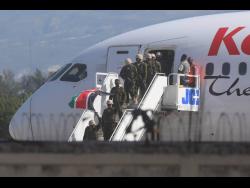Port-au-Prince (Associated Press):
The first U.N.-backed foreign police force arrived in Haiti on Tuesday, nearly two years after the troubled Caribbean nation urgently requested help to quell a surge in gang violence.
Hundreds of Kenyan police officers have arrived in the capital, Port-au-Prince, where the city's main international airport reopened in late May after being closed for nearly three months due to gang violence.
It was not immediately clear what the Kenyan troops' first mission would be, but they will face off against gangs that control 80 percent of the Haitian capital and have plundered neighborhoods in an attempt to expand their territory, leaving more than 580,000 people homeless across the country.
The Kenyan troops' arrival marks the fourth major foreign military intervention in Haiti, and while some Haitians welcome their arrival, others are wary of the troops given that the previous intervention, a 2004-2017 UN peacekeeping mission, was marred by allegations of sexual assault and the introduction of cholera.
Romain Le Coeur, a senior expert at the Global Initiative against Transnational Organized Crime, also called on the international community and government authorities to share details such as the mission's rules of engagement and operational concept.
“We're yet to hear the proper strategy for the mission on the ground, how to respond to gangs,” he said. “Is this a static mission or a mobile mission? All of those details are still up in the air and I think it's about time we had some real transparency.”
The deployment of Kenyan troops comes nearly four months after gangs began coordinated attacks on key government infrastructure in Haiti's capital and surrounding areas, seizing more than 20 police stations, opening fire on the country's main international airport and storming two of Haiti's largest prisons, freeing more than 4,000 inmates.
The UN Security Council authorized Kenya to lead the multinational police mission in October 2023, a year after Henry first requested emergency assistance.
The Kenyan police will be joined by officers from the Bahamas, Bangladesh, Barbados, Benin, Chad and Jamaica, totalling 2,500 police officers, who will be deployed in stages at a cost of about $600 million per year, according to the UN Security Council.
So far, the UN-administered fund for the mission has received just $18 million in contributions from Canada, France and the United States, which has also pledged a total of $300 million.



